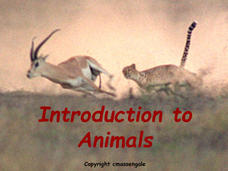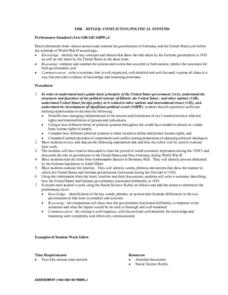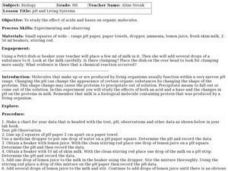Odell Education
Plant and Animal Cells
Incorporate multiple facets of the cell into your next high school lab! Through an introduction to cell organelles, class members observe each cell type and draw visuals to further demonstrate understanding of cellular processes in both...
Biology Junction
Introduction to Animals
Out of all animals, elephants alone lack the ability to jump. Scholars learn all about animals using a presentation full of fun examples. It describes different types of animals, the biological similarities and differences between...
University of Minnesota
Connect the Neurons!
Create a neuron frenzy as your pupils play the part of the neurons. An engaging lesson plan creates a human chain of neurons that pass cotton balls posing as neurotransmitters. Scholars learn about pre- and post-synapses as they...
Calvin Crest Outdoor School
Survival
Equip young campers with important survival knowledge with a set of engaging lessons. Teammates work together to complete three outdoor activities, which include building a shelter, starting a campfire, and finding directions in the...
Earth Day Network
The Neolithic Revolution
With the abundance of food products we can easily access in our society today, it is easy to forget the toll this can take on our global environment. Young learners will discover how the transition to agriculture and domesticated living...
TED-Ed
What is the World Wide Web?
Did you know that the World Wide Web and the Internet are not the same thing? Did you know that Tim Berners-Lee is considered the father of the Web? Networks, web servers, web hosts, website addresses, domain names, web languages,...
School Improvement in Maryland
Affirmative Action
Do the government's affirmative action policies promote equity in the United States? The Fourteenth Amendment to the US Constitution and affirmative action policies come under scrutiny in an activity that asks class members to...
Code.org
Practice PT - The Internet and Society
Speaking of the Internet. The culminating lesson for the unit on the Internet challenges pupils to prepare short, two-minute speeches on an issue facing society. The pupils chose from three topics that connect the Internet and...
Code.org
Asymmetric Keys – Cups and Beans
Beans are for more than just counting! Introduce public key cryptography with cups and beans and ask scholars to use the beans to send secret numbers. Participants learn how this activity relates to public key cryptography and...
Virginia Department of Education
Radical Equations
Provide students with the skill for how to examine algebraic and graphical approaches to solving radical equations. Learners solve various radical equations involving square root and cube root expressions. They first solve...
Curated OER
My Foot and the Standard Foot
Young mathematicians put one foot in front of the other as they learn how to measure length in an elementary math lesson. Using paper cutouts of their own feet, children measure classroom objects as they discover the importance of...
Constitutional Rights Foundation
Guest-Worker Program
The U.S. Guest-Worker Program and the H-2A visa are the focus of a social studies activity. First, class members assume the role of advisors who must present the president with four proposals that would amend the visas given to...
Curated OER
The Human Body, Incorporated
Second graders research each body system and writer a letter t Joe, the CEO of the Human Bdy, Incorporated, who is downsizing. In their letter, 2nd graders tell him which body parts to keep as employees.
Curated OER
Oceanography: Understanding the Relationship Among Ocean Food Chains
Fourth graders explore relationships among organisms involved in ocean food chains to investigate interdependence of the organisms.
Curated OER
The Skeleton Within
Fourth graders explore the bones, joints, and other attributes of the skeletal system.
Curated OER
Cellular Cellebrities
Sixth graders, in groups, learn the morphology and function of organelles within plant and animal cells.
Curated OER
IDENTIFYING PARTS OF THE BODY
Pupils identify and describe the various parts of the body therefore, practicing English vocabulary, pronunciation, and spelling. They discuss the various body parts, some of the inner organs and also, their functions. Finally, students...
Curated OER
Ribbit-Ouch!
Students investigate the anatomy of a frog using a virtual dissection tool in order to study the structures and organ as they relate to other animals.
Pearson
Flowering Plants
In this plants worksheet, students name and locate the major organs of flowering plants. Then students color, cut and paste a flower model by following the directions given.
Curated OER
Sizing Up the Supersize Croc
Students examine and compare traits of humans and crocodiles. In this crocodile lesson plan students use a ratio to estimate the height of a person and compare that to a crocodile.
Curated OER
Blood Business
Students identify the different kinds of blood. In this biology lesson, students investigate the antigens, agglutinins and Rh factor using their own blood. They use Punnett squares to predict blood type of offspring.
Curated OER
Anatomy of the Brain
Students explore the brain. In this science lesson, students view a diagram of the brain and discuss the various regions of the brain. Students discuss the importance of protecting the brain and design a protective covering.
Curated OER
FDR-Hitler: Conflicting Political Systems
Students compare and contrast the governments of the United States and Germany during World War II. Using different media, they identify the actions of both countries during the war and their major mistakes. They write a short summary...
Curated OER
Effects of pH on Organic Molecules
Students investigate the effects of an acid and a base on the structure of milk protein. They observe the changes to droplets of milk when adding ammonia and lemon juice and relate the changes to old, curdled milk. An extension using...























